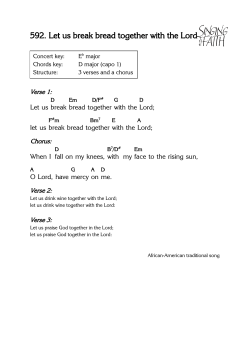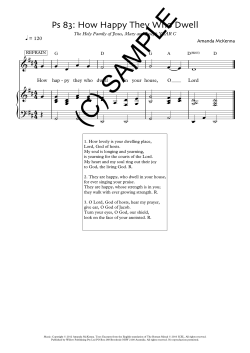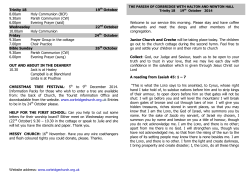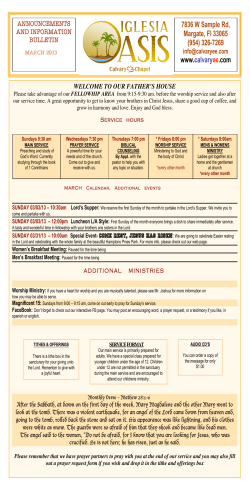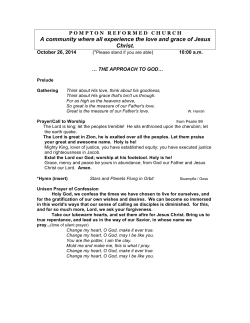
Adult Sunday School Lesson The Minor Prophets The
Adult Sunday School Lesson The Minor Prophets The Book of Nahum Yahweh’s Nature Determines His Actions Nahum 1:1-8 Situational Context: In all three chapters Nahum prophesied Nineveh's fall, which was fulfilled in 612. Nahum therefore uttered this message between 663 and 612, perhaps near the end of this period since he represents the fall of Nineveh as imminent (2:1; 3:14, 19). This would place him during the reign of Josiah and make him a contemporary of Zephaniah and the young Jeremiah. Assyria (represented by Nineveh, 1:1) had already destroyed Samaria (722–721 bc), resulting in the captivity of the northern kingdom of Israel, and posed a present threat to Judah. The Assyrians were brutally cruel, their kings often being depicted as gloating over the gruesome punishments inflicted on conquered peoples. They conducted their wars with shocking ferocity, uprooted whole populations as state policy and deported them to other parts of their empire. The leaders of conquered cities were tortured and horribly mutilated before being executed. No wonder the dread of Assyria fell on all her neighbors! About 700 bc King Sennacherib made Nineveh the capital of the Assyrian Empire, and it remained the capital until it was destroyed in 612. Jonah had announced its destruction earlier, but the people put on at least a show of repentance, and the destruction was temporarily averted. Not long after that, however, Nineveh reverted to its extreme wickedness, cruelty, and pride. The brutality reached its peak under Ashurbanipal (669–627), the last great ruler of the Assyrian Empire. After his death Assyria's influence and power waned rapidly until 612, when Nineveh was overthrown by a combination of peoples. NIV SBN Some words are addressed to Judah but most are addressed to Nineveh which at its fall was the greatest city on the world, covering over 2,000 acres. Lesson Theme: Nahum 1:2 (NIV) The Lord is a jealous and avenging God; the Lord takes vengeance and is filled with wrath. The Lord takes vengeance on his foes and maintains his wrath against his enemies. The Assyrian empire was used by God to judge other nations, including the ten northern tribes of Israel. They even at one point they threatened Jerusalem but were turned back by a great miracle of the Lord, 2 Kings 18. The focal point of the entire book is the Lord's judgment on Nineveh for her oppression, cruelty, idolatry, and wickedness. The book ends with the destruction of the city. 1. Demands Loyalty, Nahum 1:1-3 (NIV) 1 An oracle concerning Nineveh. The book of the vision of Nahum the Elkoshite. 2 The Lord is a jealous and avenging God; the Lord takes vengeance and is filled with wrath. The Lord takes vengeance on his foes and maintains his wrath against his enemies. 3 The Lord is slow to anger and great in power; the Lord will not leave the guilty unpunished. His way is in the whirlwind and the storm, and clouds are the dust of his feet. Interpretation: The LORD places Nineveh (the Assyrian empire) on notice that they are before the LORD’s bar of justice. An oracle is a prophecy from God. The Assyrians tried to destroy Jerusalem in 690 BC. Supporting Texts: Jonah 3:4 (NIV) On the first day, Jonah started into the city. He proclaimed: "Forty more days and Nineveh will be overturned." Jonah 3:10 (NIV) When God saw what they did and how they turned from their evil ways, he had compassion and did not bring upon them the destruction he had threatened. 2 Kings 18:31-33 (NIV) 31 "Do not listen to Hezekiah. This is what the king of Assyria says: Make peace with me and come out to me. Then every one of you will eat from his own vine and fig tree and drink water from his own cistern, 32 until I come and take you to a land like your own, a land of grain and new wine, a land of bread and vineyards, a land of olive trees and honey. Choose life and not death! "Do not listen to Hezekiah, for he is misleading you when he says, 'The Lord will deliver us.' 33 Has the god of any nation ever delivered his land from the hand of the king of Assyria? 2 Kings 19:35-37 (NIV) 35 That night the angel of the Lord went out and put to death a hundred and eighty-five thousand men in the Assyrian camp. When the people got up the next morning-there were all the dead bodies! 36 So Sennacherib king of Assyria broke camp and withdrew. He returned to Nineveh and stayed there. 37 One day, while he was worshiping in the temple of his god Nisroch, his sons Adrammelech and Sharezer cut him down with the sword, and they escaped to the land of Ararat. And Esarhaddon his son succeeded him as king. Discussion Starters: What is the LORD’s jealousy? What does the LORD avenge? Who are the LORD’s foes and enemies? What claim did the LORD have on Nineveh? 2. Exercises His Sovereignty, Nahum 1:4-6 (NIV) 4 He rebukes the sea and dries it up; he makes all the rivers run dry. Bashan and Carmel wither and the blossoms of Lebanon fade. 5 The mountains quake before him and the hills melt away. The earth trembles at his presence, the world and all who live in it. 6 Who can withstand his indignation? Who can endure his fierce anger? His wrath is poured out like fire; the rocks are shattered before him. Interpretation: God’s sovereignty over nature demonstrates His ability to carry out His righteous decrees. The prophet offers a poetic portrayal of the power of the Lord as manifested in His control of nature at Creation and on other occasions of intervention on behalf of His people. The godly Israelite recognized the Lord's work in nature. But nature is not confused with God or worshiped as God; it is the theater of His revelation. Supporting Texts: Exodus 14:21 (NIV) Then Moses stretched out his hand over the sea, and all that night the Lord drove the sea back with a strong east wind and turned it into dry land. The waters were divided, Psalms 18:7 (NIV) The earth trembled and quaked, and the foundations of the mountains shook; they trembled because he was angry. Matthew 8:26 (NIV) He replied, "You of little faith, why are you so afraid?" Then he got up and rebuked the winds and the waves, and it was completely calm. Discussion Starters: What is the point of Nahum’s description of God’s sovereignty over nature? Why does God use nature to exercise wrath and judgment? 3. His Purpose is Good, Nahum 1:7 (NIV) The Lord is good, a refuge in times of trouble. He cares for those who trust in him, Interpretation: The term denotes the Lord's benevolence as the source of all true human wellbeing and prosperity, and is particularly a confession of His abundant covenant blessings and kindness. The Lord's people experience His awesome power as holy love. When help is needed He is an impregnable fortress. Supporting Texts: Psalms 73:1 (NIV) Surely God is good to Israel, to those who are pure in heart. Psalms 46:6-7 (NIV) 6 Nations are in uproar, kingdoms fall; he lifts his voice, the earth melts. 7 The Lord Almighty is with us; the God of Jacob is our fortress. Selah 2 Timothy 2:19 (NIV) Nevertheless, God's solid foundation stands firm, sealed with this inscription: "The Lord knows those who are his," and, "Everyone who confesses the name of the Lord must turn away from wickedness." Discussion Starters: How is the goodness of God demonstrated in the destruction of Nineveh? Was there any connection between Nineveh’s destruction and their attempt to destroy Jerusalem? 4. Just in His Judgment, Nahum 1:8-9 (NIV) 8 but with an overwhelming flood he will make an end of [Nineveh]; he will pursue his foes into darkness. 9 Whatever they plot against the Lord he will bring to an end; trouble will not come a second time. Interpretation: The second purpose of this oracle is to comfort Judah that God will deal with the threat to their safety, this enemy will not threaten them a second time. Supporting Text: Nahum 1:12 (NIV) This is what the Lord says: "Although they have allies and are numerous, they will be cut off and pass away. Although I have afflicted you, [O Judah,] I will afflict you no more. Application Questions: What was at stake in Jerusalem’ survival? How may we apply this today? What does this Covenant mean in regards to this oracle? Genesis 12:3 (NIV) I will bless those who bless you, and whoever curses you I will curse; and all peoples on earth will be blessed through you." Why didn’t the LORD spare the Northern Kingdom?
© Copyright 2026
